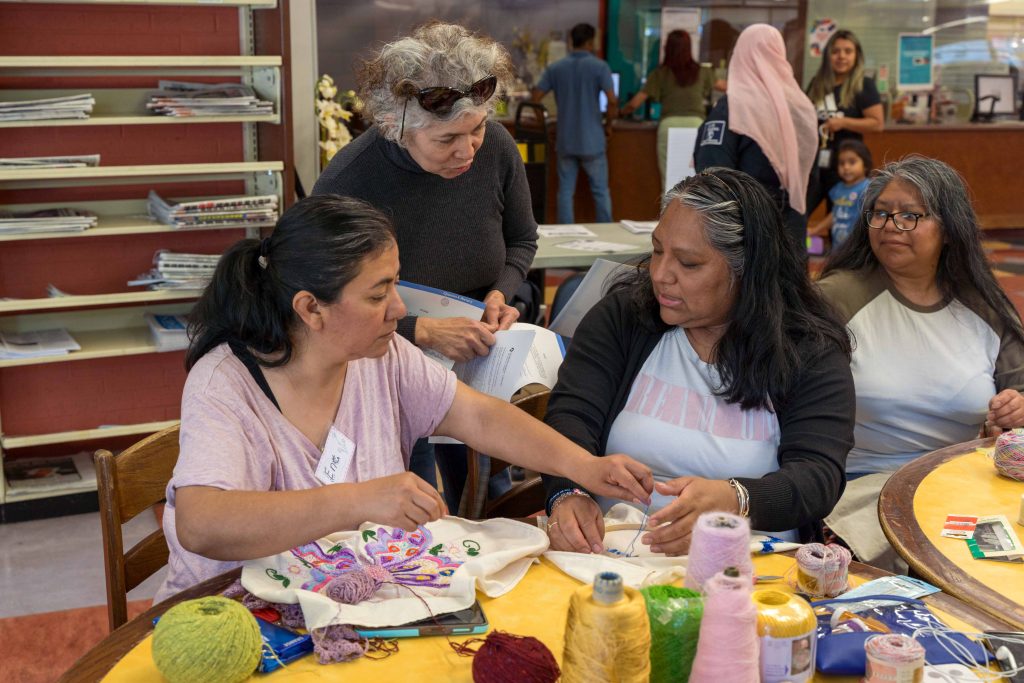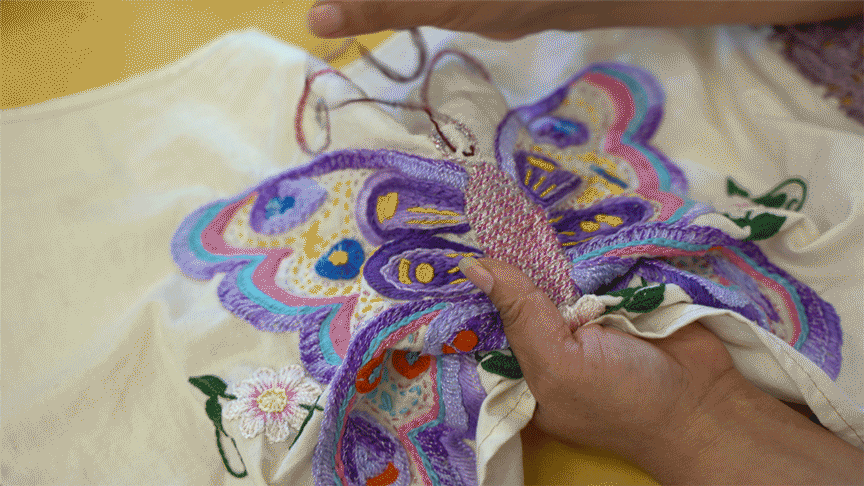At the Queens Library in Corona, a group of 16 migrant mothers sit around oval tables. They each have a piece of cloth in their hands, where, with precise dexterity, they puncture it with a needle, feed the thread through, and pull the needle to knot it tight. They are stitching the wings of butterflies.
The group, Comadres Bordadoras, comes together every Monday at noon to sew servilletas, traditional Mexican cloth napkins used to wrap tortillas, while offering a safe space where the mothers can discuss the topics of family, migration, and mental health. The members say their goal is to support the immigrant experience of mothers by weaving the cultural craft with their unique stories of migration.
Also Read: Migrant Children Face Trauma, Homelessness As They Seek Asylum in NYC
The group was created out of necessity, the founder, Flavianna Linares, 45, explains. During the peak of the pandemic she remembers that the vivacity of her neighborhood of Elmhurst — which boasts one of the highest foreign born populations in New York City — was replaced by a deafening silence, except for the ambulances that traveled the length of Roosevelt Avenue towards Elmhurst Hospital. Every time she heard a siren it would signify a new coronavirus victim, she recalls.
She lost her job of three years as a house cleaner when the city went on lockdown, which aside from bringing financial burdens also forced her to stay inside due to fear of contracting the coronavirus. She remembers keeping herself busy: making breakfast for her husband and two children, completing any chores, and tidying up the house. The rest of the day was spent watching the news in her living room, and checking in on her family members from her country of Mexico. The repetition filled her with anxiety.
In May of 2021, however, her grandmother, Abelina, came to her mind. It took Linares back to her province of San Pedro in the state of Puebla when she was seven years old. She saw her grandmother and aunt sitting inside the kitchen as the pots and pans were cooking on the stove. The smell of sautéed beans and condiments filled the house, she said.
They were preparing lunch for the family members working on the fields and tending to their cattle. But what caught her attention in that memory, she emphasizes, was that her aunt and grandma were busy knitting servilletas. Those napkins were staples in Mexico and almost everyone, including herself at that young age, learned the craft.
Linares knit less and less throughout the years as she had to focus on school and work. When she migrated to the United States 20 years ago, the craft was overshadowed by the necessity to cover her expenses in New York City, and the responsibilities associated with being a mother took most of her time. But that spring morning, as the City was still recovering from the pandemic, the idea of creating the group to intentionally give room for mothers to share their troubles at home — just like her aunt and grandma did — came to mind.
“I called my closest friends who live in the area and I told them let’s get together and let’s knit,” Linares explains. She recalls her friend, Gaby, was skeptical about joining because she never learned how to knit in her country of Uruguay. Eventually she was convinced and they began meeting at their homes once a week.
Culture, Migration and Safe Space

Linares says that she cannot stay still. She likes to be active, laugh, and engage in conversation. “How are you feeling? What did you do throughout the week? What is new? Tell us a joke,” Linares remembers asking the group during the first meetings when it was just her and three of her friends. She recalls that all of them had bottled up their emotions during the pandemic.
Gaby Paiero, who has been part of the group for more than a year, says the pandemic caused her anxiety. She was unable to share with her family to avoid worrying them. She had known Linares from volunteering with local organizations in the past and when the idea of the Comadres Bordadoras came up, it took her a while to be convinced.
What attracted her the most, she says, was that they are all able to identify as women and as mothers and then use those experiences to provide feedback. “Someone would say I am struggling with this, or feeling this way, and then someone else would jump in and offer solutions,” she said.
María Verónica “Marve” Romero Hernández, 50, has also been with the group for more than a year. She grew up in Mexico and has been continuously residing in the United States since 2007 when she settled in New York. She says her experience arriving was a cultural shock.
“I left my mom’s house, very spacious and then over here I was living in a shared small apartment,” Romero Hernández said, explaining the new country, the language, and the struggles of limited opportunities without an authorized status often made her cry.
Romero Hernández says that she did not know of any organization that could help her in the past that she often felt alone. “It took me years before I was able to share my problems and feel comfortable asking for help.”

She says she now wants to use her 20 year experience of being an immigrant in New York to empower other immigrant mothers as they adjust here. “The public spaces are ours too, we need to use them and not feel ashamed of speaking or showing our culture,” she said.
Some of the mothers interviewed by Documented have just arrived in New York, while others have been living here for decades.
Also Read: Nonprofit New Women New Yorkers Prepares Immigrants for the Job Market
“Right now we are sewing a butterfly, and butterflies are symbols of messengers” María Vega says. She arrived from Ecuador in February of this year and says she has been unable to find a job. She found out about the group when she was visiting the library and they caught her eye. “Instead of staying at home alone, I come here to speak with them, sharing our stories and learning from their advice. It also aids our mental health.”
Comadres Bordadoras has grown to more than 24 members in the past year. Linares said that they are looking for a new place where they can accommodate more members as their stay at the Queens library expired at the start of June.
Also read: The Museum of Chinese in America Makes the Case for Celebrating AAPI Heritage Month





